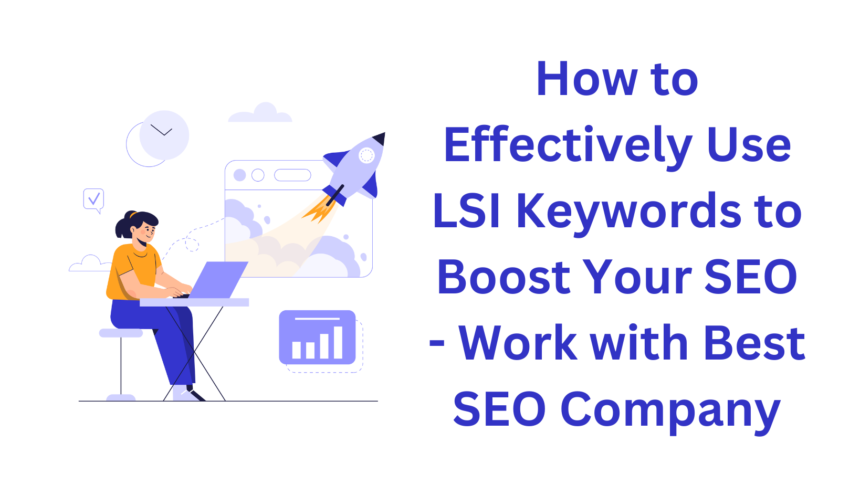In the ever-evolving world of search engine optimization, staying ahead means understanding how search engines interpret your content. One often overlooked but highly effective strategy is using LSI (Latent Semantic Indexing) keywords to boost your SEO. When done right, LSI keywords can improve your search visibility, provide better context to your content, and make your website more user-friendly.
Let’s break down what LSI keywords are and how you can use them to strengthen your SEO efforts.
What Are LSI Keywords?
LSI keywords are words and phrases that are semantically related to your primary keyword. Unlike synonyms, which are exact replacements, LSI keywords are contextually relevant terms that help search engines understand the meaning of your content.
For example:
- Primary Keyword: “Digital Marketing”
- LSI Keywords: online advertising, SEO strategies, content marketing, PPC campaigns, lead generation.
Search engines like Google use LSI keywords to determine the relevance and depth of your content. By including these terms, you make your content more comprehensive, helping it rank better for related queries.
Why Are LSI Keywords Important for SEO?
- Improved Search Engine Understanding: Google and other search engines analyze LSI keywords to understand your content beyond the primary keyword. This ensures your content ranks for related terms and queries.
- Avoids Keyword Stuffing: Instead of awkwardly repeating the same keyword multiple times, LSI keywords let you diversify your language naturally while maintaining relevance.
- Better User Experience: Incorporating related terms adds value and context for readers, making your content more helpful and engaging.
- Higher Rankings for Related Queries: By covering a range of related terms, your page can rank for multiple search queries, attracting more organic traffic.
How to Find LSI Keywords
Finding LSI keywords is simpler than you might think. Here are a few proven methods:
- Google’s Auto-Suggest and Related Searches
- Type your primary keyword into Google and check the auto-suggestions as you type.
- Scroll to the bottom of the search results to find “related searches” for additional ideas.
- Google Keyword Planner
- This tool provides keyword variations and search volume data, helping you identify relevant terms.
- LSI Keyword Tools
- Platforms like LSIGraph, Ubersuggest, or Ahrefs can generate a list of semantically related keywords.
- Analyze Competitor Content
- Study top-ranking pages for your target keyword and note the related terms they include.
How to Use LSI Keywords Effectively
Once you’ve identified relevant LSI keywords, here’s how to integrate them into your content:
- Incorporate Them Naturally in Content
Don’t force LSI keywords into your content. Use them naturally where they fit—within paragraphs, headings, or bullet points. The goal is to enhance readability, not disrupt it. - Optimize Titles and Headings
Include LSI keywords in subheadings (H2, H3) to create better content structure and signal relevance to search engines. - Improve Meta Descriptions and Alt Text
Use LSI keywords in meta descriptions and image alt text to strengthen on-page SEO without sounding repetitive. - Create Comprehensive Content
LSI keywords allow you to explore a topic in depth. Address related questions, subtopics, or concepts within a single blog post to boost relevance. - Add LSI Keywords in Anchor Text
When linking internally or externally, use LSI keywords in your anchor text to make your links more contextually relevant. - Enhance Content With FAQs
Use LSI keywords to create an FAQ section that answers common queries related to your primary keyword.
Common Mistakes to Avoid
While LSI keywords are powerful, misusing them can backfire. Here’s what to avoid:
- Keyword Stuffing: Adding too many LSI terms can confuse readers and search engines. Focus on quality over quantity.
- Ignoring User Intent: LSI keywords must align with the search intent behind your content.
- Over-Optimization: Using LSI terms in every sentence feels unnatural. Use them sparingly and in a way that benefits the reader.
Conclusion
Incorporating LSI keywords into your content strategy is a subtle yet effective way to enhance your SEO performance. By using related terms strategically, you’ll create content that’s comprehensive, user-friendly, and favored by search engines. For businesses looking to scale their organic reach, consulting an organic SEO consultant can provide the expertise needed to implement advanced SEO strategies, including the proper use of LSI keywords.







